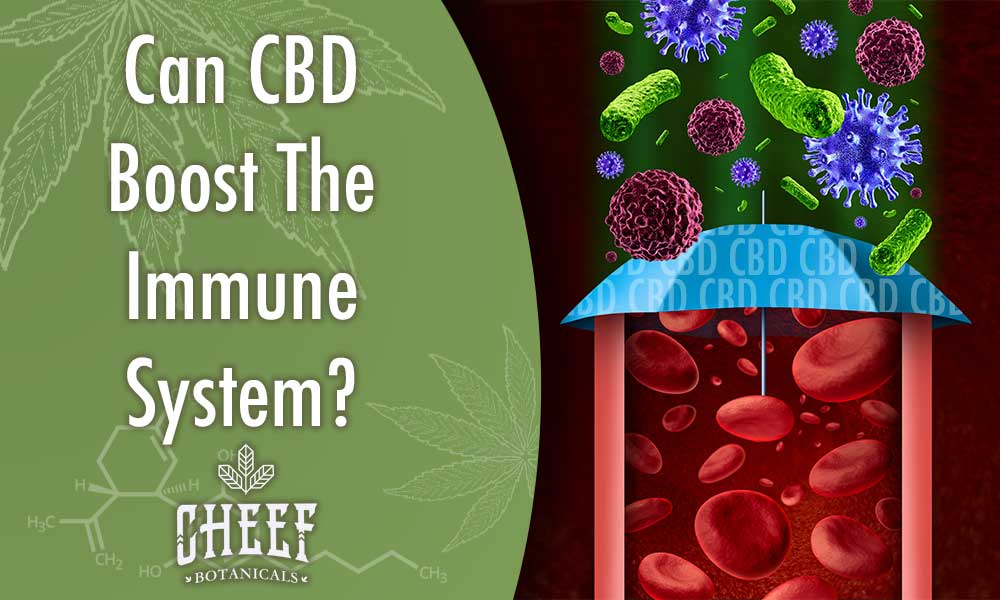Did you know that nearly 5,000 years ago the Chinese Emperor Fu Hsi (2900 BC) noted that cannabis was a very popular medicine that possessed both yin and yang? It's true, today cannabis cannabinoids (like CBD and THC) are being used in medicines (like Epidiolex or Sativex) around the world. Research suggests that CBD alone may have over 50 mechanisms of action to help the human body. For example, because of CBD's unique properties, it may help suppress or boost your immune function. Maybe these suppressing and boosting properties are the yin and yang effects the emperor was referring to? Let's see what impact CBD can have on the immune system.



What Exactly is CBD?
CBD stands for Cannabidiol, which is an extract from the cannabis plant. It belongs to a group of compounds known as cannabinoids that have a wide variety of beneficial effects on the human body. CBD is now added to products like capsules, oil, edibles, and more because the compound does not cause intoxication like THC, which is the primary cannabinoid found in marijuana. This means that CBD offers all the plant's benefits without the unwanted side effects that can impair a person's functionality from day-to-day.How Does CBD Affect the Immune System?
Before we jump into how CBD affects our immune system, let’s take a moment to discuss a crucial structure of the human body: the endocannabinoid system (ECS). This is a control and regulatory network made up of endocannabinoids (like anandamide and 2-AG), enzymes that break these down, and cannabinoid receptors. These receptors are classified as:CB1 Receptors:
These are found mostly in the central nervous system (CNS) like the brain and spinal cord.CB2 Receptors:
Most of these receptors reside in our immune system, especially in B lymphocytes, T lymphocytes, natural killer cells (NK cells), and macrophages. According to recent research, there are approximately 10 to 100 times more CB2 receptors than CB1 receptors. These findings suggest that most cannabinoid receptors in your body are working within your immune system.
CB2 Receptors & The Immune System
Researchers originally thought that CB1/CB2 receptors were located only in the brain. However, the discovery of these receptors throughout the body, especially on the various cells of the immune system, revolutionized our understanding of how the ECS interacts with the overall immune system. Essentially, their function is intricately linked and the ECS is responsible for an overall state of harmony and balance, aka homeostasis.Immunocannabinoid Modulation
There is mounting evidence that cannabinoids in general, and CBD specifically, may have therapeutic and wellness applications for the immune system. Some researchers refer to this as immunocannabinoid modulation. Essentially, it appears as if CBD interacts with the ECS to help regulate and modulate the function of the immune system. These effects are not fully understood quite yet, but current research indicates that optimal concentrations of certain cannabinoids may reduce inflammatory responses in patients suffering from certain autoimmune disorders, including:- Multiple sclerosis
- Arthritis (rheumatoid arthritis)
- Lupus
- Encephalomyelitis
- Parkinson’s
CBD & Inflammation
So what does this immunosuppressant effect mean on a cellular level? Well, CBD is especially effective as an anti-inflammatory. It’s important to remember that inflammation is a basic response of the immune system and is characterized by the five classical signs of inflammation:- Heat
- Pain
- Redness
- Swelling
- Loss of function
- Reducing cytokine production – These are a group of substances (like interferon, interleukin, and growth factors) that are crucial in cell signaling and modulation of the immune system.
- Inhibiting T lymphocyte function – Also known as T-cells, these immune cells can become over-vigilant and trigger auto-immune disorders by attacking otherwise healthy tissues.
- Up-regulation of gamma-Aminobutyric acid (GABA) – This neurotransmitter is a potent anti-inflammatory and its primary role is reducing the level of excitability in neurons throughout the nervous system.
- Down-regulation of glutamate – This neurotransmitter has basically the opposite effect and function that GABA does. Furthermore, it has been observed that cytokines can influence glutamate metabolism via effects on cells called astrocytes and microglia.

Can Stimulating the ECS Help the Immune System?
What exactly do we mean when we talk about CBD’s biphasic nature? Let’s take a step back and consider the concept of homeostasis in a little more detail. Why is this so important to our health and function? What does it mean for the body and immune system to be in homeostasis? It’s important to remember that the human immune system is enormously complex. In fact, there are about 350 separate signaling molecules that are part of this amazing physiological structure. Furthermore, there are two fundamental ways that our body’s immune system can use this structure to seek out and eliminate intruding pathogens:1) Cell-Mediated Immunity
This involves the use of T lymphocytes (or T-cells) to seek out and destroy the pathogens by causing apoptosis. Apoptosis is just a fancy way of saying that the T-cells cause the pathogens to self-destruct. This is sometimes colloquially referred to as “programmed cell suicide”.2) Humoral Immunity
This involves the use of B lymphocytes (or B-cells) to produce antibodies. The immune system uses these antibodies system to neutralize dangerous pathogens. It is absolutely vital that the two adaptive responses of the immune system work in harmony with one another. If one becomes too dominant over the other, then auto-immune disorders can develop in which over-vigilant T-cells start to destroy otherwise healthy tissues. Interestingly enough, it appears as if the primary role of the ECS in immune function is to ensure that these two responses are properly regulated and modulated, thus maintaining a constant state of homeostasis between the two. When this balance extends down from the ECS to the immune system, our body undergoes a process that some cannabis researchers refer to as a homeostasis cascade. This just means that multiple systems in the body are operating optimally and efficiently. CBD is unique in that it can either suppress or boost the immune response based on the physiological needs of the body. This means that it can be a critical part of achieving this homeostasis cascade!
How Much CBD Should You Take?
First, let’s just establish the fact that CBD oil and other CBD products are incredibly safe! Overdoses from CBD are literally non-existent. In fact, a 2011 study in Current Drug Safety concluded that:- A healthy human could take up to 1,500 milligrams (1.5 grams) a day with few to no serious side effects.
- A person would have to take about 20,000 milligrams (20 grams) of CBD in a very short period of time for the dose to possibly be toxic.
- Standard dose – ¼ milligram (0.25 mg) for every 1 pound of body weight. For example, a 200-pound person would take 50 milligrams (200lbs x 0.25mg = 50mg).
- High dose – ½ milligram (0.5 mg) for every 1 pound of body weight. So a 200-pound person would take 100 milligrams (200lbs x 0.5mg = 100mg).
Have a question about CBD dosage? find your answer here along with our handy dosing chart.As with any supplement, it’s always prudent to confer with your physician to ensure that it will not have any negative interactions with your other medications. Check out this page Cheef Botanicals.



 CBD Gummies - Top Seller
CBD Gummies - Top Seller
 CBD + THC Gummy - Excellent Choice
CBD + THC Gummy - Excellent Choice
 CBD Hemp Flower - Highly Rated
CBD Hemp Flower - Highly Rated
 Full Spectrum CBD Oil - Good Value
Full Spectrum CBD Oil - Good Value



Leave a comment
This site is protected by hCaptcha and the hCaptcha Privacy Policy and Terms of Service apply.